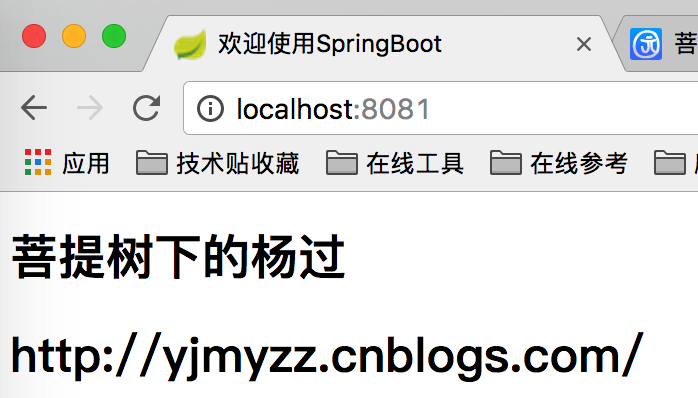spring-boot 提供了很多默认的配置项,但是开发过程中,总会有一些业务自己的配置项,下面示例了,如何添加一个自定义的配置:
一、写一个自定义配置的类
package com.example.config;
import lombok.Data;
import org.springframework.boot.context.properties.ConfigurationProperties;
import org.springframework.stereotype.Component;
/**
* Created by 菩提树下的杨过 on 2017/4/15.
*/
@Data
@Component
@ConfigurationProperties(prefix = "web.config")
public class WebConfig {
private String webTitle;
private String authorName;
private String authorBlogUrl;
}
注意上面的注解@ConfigurationProperties(prefix = "web.config"),这表示这个类将从属性文件中读取web.config开头的属性值
二、在application.yml中配置属性
spring-boot支持properties及yml格式,不过推荐大家使用新的yml格式,看上去更清晰
web:
config:
webTitle: "欢迎使用SpringBoot"
authorName: "菩提树下的杨过"
authorBlogUrl: "http://yjmyzz.cnblogs.com/"
三、来一发
为了演示效果,可以弄一个最简单的web应用,先来一个controller
package com.example.controllers;
import com.example.config.WebConfig;
import org.springframework.beans.factory.annotation.Autowired;
import org.springframework.stereotype.Controller;
import org.springframework.ui.ModelMap;
import org.springframework.web.bind.annotation.RequestMapping;
@Controller
public class IndexController {
@Autowired
WebConfig webConfig;
@RequestMapping("/")
String index(ModelMap map) {
map.addAttribute("title", webConfig.getWebTitle());
map.addAttribute("name", webConfig.getAuthorName());
map.addAttribute("blog", webConfig.getAuthorBlogUrl());
return "index";
}
}
然后在index.html模板中写点东西(注:本例使用了thymeleaf做为模板引擎)
<!DOCTYPE html>
<html xmlns:th="http://www.thymeleaf.org">
<head>
<title th:text="${title}"></title>
</head>
<body>
<div>
<h1 th:text="${name}"/>
<h1 th:text="${blog}"/>
</div>
</body>
</html>
最后跑起来的运行效果如下:

四、配置文件的加载顺序
把所有配置全都打在一个jar包里,显然不是最好的做法,更常见的做法是把配置文件放在jar包外面,可以在需要时,不动java代码的前提下修改配置,spring-boot会按以下顺序加载配置文件application.properties或application.yml:
4.1 先查找jar文件同级目录下的 ./config 子目录 有无配置文件 (外置)
4.2 再查找jar同级目录 有无配置文件(外置)
4.3 再查找config这个package下有无配置文件(内置)
4.4 最后才是查找classpath 下有无配置文件(内置)
附:源代码下载 spring-boot-web-demo.zip
参考文章: